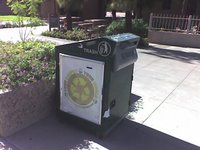Teaching Writing at ASU
Writing Programs at ASU is one of the largest writing programs. As such, we are always looking for enthusiastic writing teachers who can contribute to our ongoing effort to provide quality writing instruction to our students.
I addition to classroom teaching, there are many opportunities for professional development--workshops, lectures and conferences. Many writing teachers also gain valuable professional experience by participating actively in curriculum development, mentoring, and conference organization.
Here are some of the current job postings for writing teachers in the Writing Programs at ASU:
Instructors Positions: Four courses/semester. Nine-month appointment. Submit: Letter of application, vita, 1 page statement of teaching philosophy, unofficial graduate transcripts, and 3 letters of recommendation about teaching ability. To meet the first deadline, applications must be postmarked by January 2, 2008; then if not filled postmarked by the 1st of each month thereafter until search is closed. PLEASE DO NOT send your application letter, vita, letters of reference, etc, separately. We do not accept incomplete applications. AA/EOE. AA/EOE
- Instructors in Composition and Rhetoric -- Required: MA in Rhetoric and Composition or in a related field; post-secondary teaching experience in composition. Applicants who are not native English speakers must provide evidence of having received a minimum score of 55 on either the SPEAK test or the TSE. Desired: Evidence of graduate coursework in Rhetoric and Composition if degree in related field; Ph.D. in Rhetoric and Composition or related field; evidence of effective teaching; evidence of attendance/presentations at Rhetoric/Composition professional conferences. Send materials to Search Committee, (Instructor, Rhet/Comp), attn. D. Baker, English Department, Writing Programs, Box 870302, Arizona State University, Tempe, AZ 85287-0302.
- Instructors in rhetoric and composition with an emphasis in professional writing -- Required: MA in Rhetoric and Composition or in a related field; graduate-level coursework in business, professional and/or technical writing; post-secondary teaching experience in composition or business / professional / technical writing. Applicants who are not native English speakers must provide evidence of having received a minimum score of 55 on either the SPEAK test or the TSE. Desired: Evidence of graduate coursework in Rhetoric and Composition if degree in related field; Ph.D. in Rhetoric and Composition or related field; evidence of effective teaching; evidence of attendance/presentations at Rhetoric/Composition professional conferences. Send materials to Search Committee, (Instructor, Professional Writing), attn. D. Baker, English Department, Writing Programs, Box 870302, Arizona State University, Tempe, AZ 85287-0302.
Faculty Associates -- Required: MA degree in English or in a related field; post-secondary teaching experience in composition required. Applicants who are not native English speakers must provide evidence of having received a minimum score of 55 on either the SPEAK test or the TSE. Desired: Evidence of graduate coursework in Rhetoric and Composition; Ph.D. in English; Evidence of professional development; Evidence of effective teaching. General information: Teach one to four composition courses/semester. One semester contract, eligible for renewal. Submit: Letter of application, vita, one page statement of teaching philosophy, unofficial graduate transcripts, SPEAK test or TSE score (if applicable) and 3 letters of recommendation about teaching ability postmarked by 5:00 p.m., February 1, 2008; if not filled, the first of each month thereafter until search is closed, to Search Committee (FA, Rhet/Comp), attn. D. Baker, ASU English Department, Box 870302), Arizona State University, Tempe, AZ 85287-0302. PLEASE DO NOT send your application letter, vita, letters of reference, etc, separately. We do not accept incomplete applications. AA/EOE
Writing Programs
Department of English
Arizona State University
Labels: announcement, job announcements, job search



